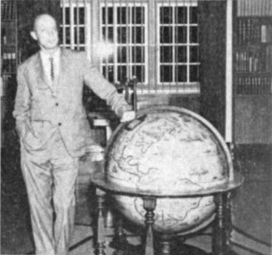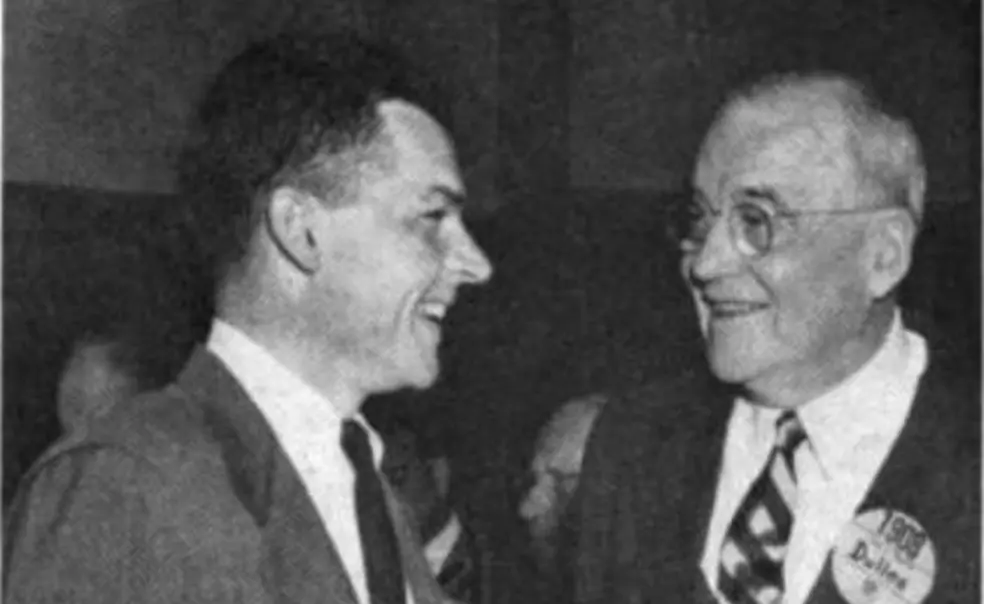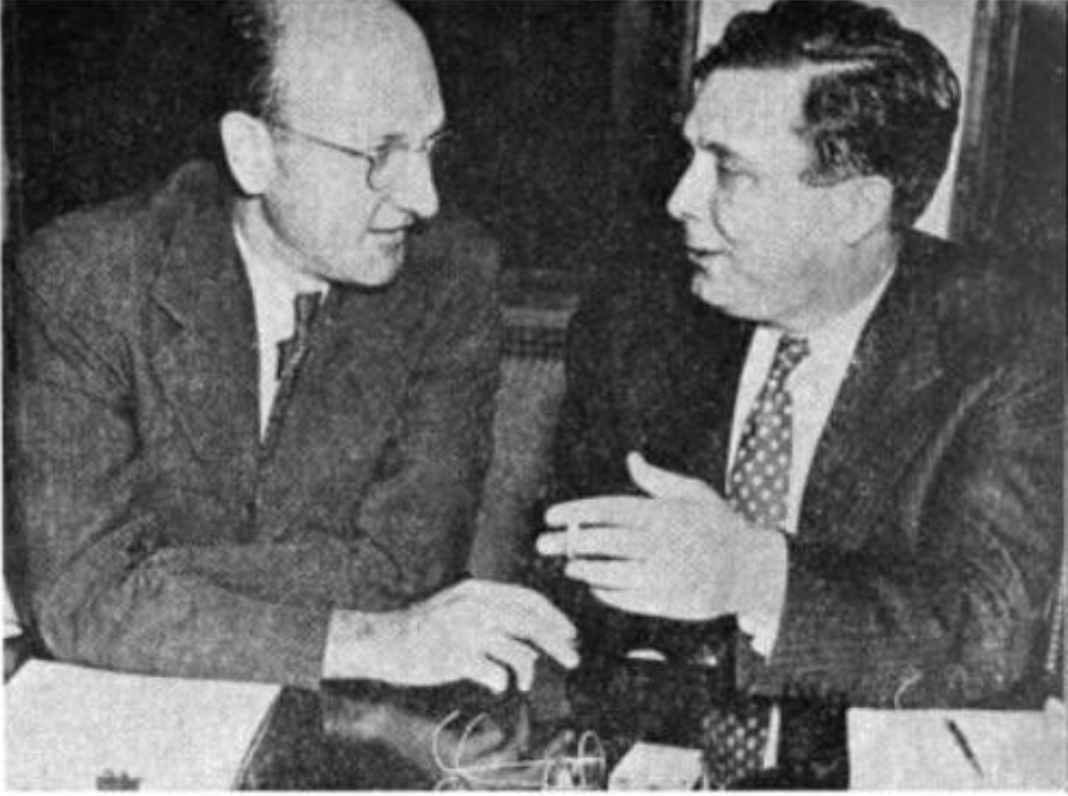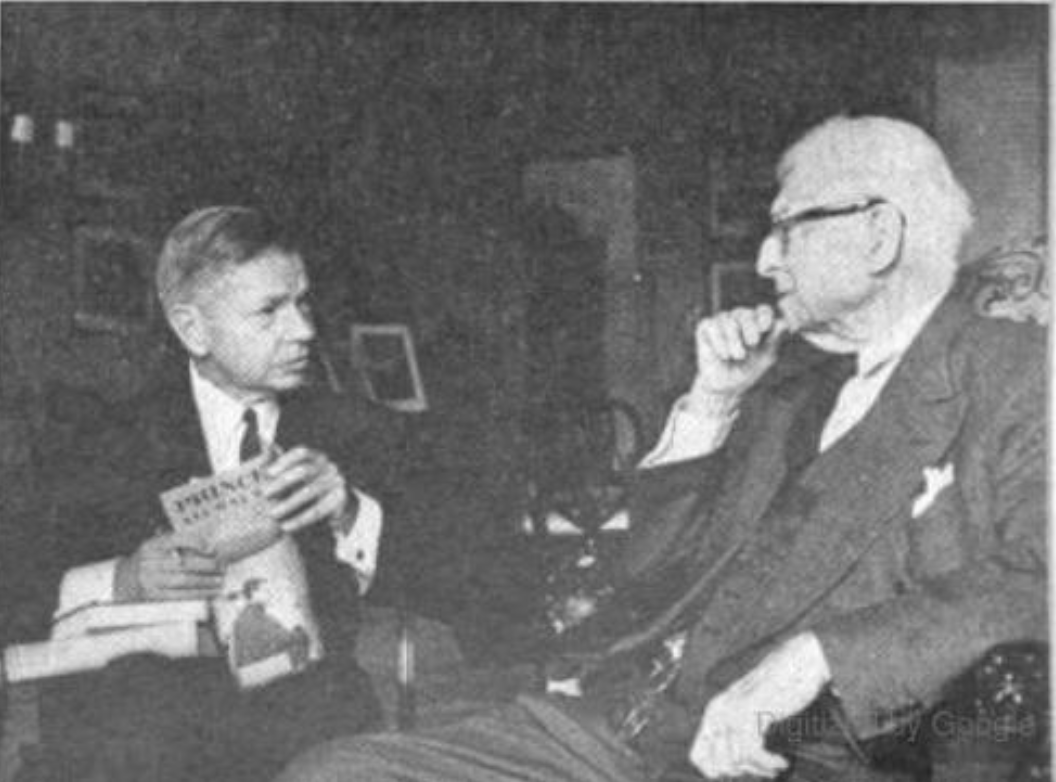The John Foster Dulles ’08 Oral History Project
One of the exciting new projects at Princeton today is the Center for Studies in Twentieth Century American Statecraft and Public Policy, designed to stimulate research in the development of American public policy, domestic and foreign, emphasizing the use of primary sources. Its director is Professor Robert A. Lively of the History Department, its headquarter the Dulles wing of the Firestone Library. Among its many collections are the papers of John Foster Dulles ’08, Adlai E. Stevenson ’22, James V. Forrestal ’15, Bernard M. Baruch (opposite page) and David E. Lilienthal (opposite page and page 5), not to mention the Woodrow Wilson ’79 Collection. Jim Rubin is president of the University Press Club and wrote this piece for ‘Town Topics’ this summer, from which it is reprinted by permission. – Editor (1964)
On the third floor of Firestone Library overlooking the Princeton University Student Center, there is a small office containing among other things three tape recorders, two of them battery-powered. On the wall to one side of the desk there is a picture bearing this inscription: “With grateful appreciation for his dedicated research in my Secretary of State papers.” Dated December 1956, the picture is signed by John Foster Dulles and is a tribute to Dr. Philip A. Crowl.
An acquaintance of Mr. Dulles when the late Secretary of State was alive, Dr. Crowl has been intimately concerned for the past six months with preserving and enriching the record of the statesman’s career. His third-floor library office is the headquarters for Princeton’s Dulles Oral History Project.
A leaflet describing the project says its purpose “is to add substantially to the Dulles papers by tape-recording a series of interviews with national and world leaders. The tapes thus obtained, and the transcripts made from them, will be deposited in the John Foster Dulles Library.” In his words: “This whole process is being conducted to breathe life into the documentary history we have of Mr. Dulles. Our purpose is to fill in the gaps of his career, his motivations and his personality for the benefit of future historians.” The project, which should be completed within three years, will probably have more than 250 tape recordings.
Dr. Crowl, a tall, lean man of 49 years of age who speaks in a brisk, straightforward manner, is peculiarly well qualified to direct the Dulles project. He is completing a six-month leave from the State Department’s Bureau of Intelligence and was acquainted with Mr. Dulles from 1955 until he completed his career in 1959. In 1956, he helped select the Secretary of State papers which have been microfilmed and deposited with Princeton.
That, however, only describes part of his qualifications to direct the project. For a half-dozen years before and after World War II, he taught in the Department of History. As director of the oral history project, Dr. Crowl has spent only a fraction of his time in his Firestone Library office. His travels have taken him to England, France and Watertown, N.Y., the home of Mr. Dulles.
Among the distinguished men he has interviewed are Pierre Mendes-France, the former French foreign minister, Sir Roger Makins, the United Kingdom’s Ambassador to the United States, and within the next week he plans to speak to Gen. Dwight D. Eisenhower.
The interviews, said Dr. Crowl, last from between one and five hours and may involve more than one session depending on their length. “I try to make my interviews as conversational as possible,” he continued. “But the nature of the interview varies according to the subject. Sometimes you can ask one question and the subject will take it from there and at other times it’s a matter of question and answer, question and answer. In any event, I try to prevent the interview from becoming an interrogation.” The interview itself is actually the easy part of the work. The homework involved – preparing the interview, arranging convenient times and places – is the more difficult part of the director’s job.
He is assisted by a half-dozen other interviewers. But Dr. Crowl expects to conduct about half the interviews and he is responsible for making the arrangements for all of them. The process begins with a letter from President Goheen to the subject and is followed up by an explanatory letter from Dr. Crowl and possibly a preliminary interview.
Curiously enough, Dr. Crowl expects that very few people will actually want to listen to the tapes. Judging by the experience of previous projects, he explained, most of the listeners – all of whom must be qualified scholars – will prefer to read the transcripts of the interviews.
“The people who will want to use these tapes,” he continued, “will be interested in taking notes, for one thing, and may want to save time by skimming over segments of the interview they consider unimportant, for another. The Columbia University oral history project has reported that only one person has listened to the tapes.”

The project, which is supported in part by a Rockefeller Foundation grant, is run by an advisory committee of friends and associates of Mr. Dulles and educators. Use of the transcripts and tapes will be limited to serious historians.
The terms of when the interviews may be used and who may use them are specified by the people who are interviewed, he continued. But the qualifications for being a “serious scholar” will be broadly interpreted. For instance, said Dr. Crowl, “a Princeton undergraduate writing a thesis might qualify. But the tapes won’t be used by sensationalists or curiosity seekers.”
Though admittedly modest in comparison to a similar project centered around the career of John F. Kennedy, the Dulles collection is expected to be of great value to future historians. “After all,” he noted, “Mr. Dulles was certainly a strong person and the dominant figure in the conduct of foreign affairs between 1953 and 1959.”
“I can’t reveal at this time any of the statements in the tapes we’ve already completed,” he continued. “But, in my opinion what has emerged is a clearer record of Mr. Dulles as a person and as a statesman. We’ve gained a great many insights into his personality and a lot of clues that will contribute to a better understanding of him, and we’ve only completed a couple dozen tapes.”
The tape recordings and transcript will be added to the John Foster Dulles Library of state and personal papers. Mr. Dulles, who was graduated from Princeton in 1908, contributed his private papers to the University as well as microfilm copies of some 100,000 pages of State Department documents. They are housed in the Dulles Library of Diplomatic History, a wing of the Firestone Library. In addition to their use by scholars, it is possible that teachers may want to play excerpts of the tapes in their classes. This too will depend upon the wishes of the subjects interviewed as well as the library officials.
Dr. Crowl said he has found his work of the past six months unique and interesting but “a completely different kettle of fish” from work in the State Department’s Bureau of Intelligence. He is due to return to Washington, D.C., and that other “kettle of fish” at the beginning of August, but he will continue to work for the project.
The administrative duties will likely be placed in other hands, as yet undecided, while he continues to conduct interviews in Washington. He has deliberately reserved the Washington interviews for his return to the State Department to avoid traveling needlessly.
The advisory committee in charge of the project is headed by Hugh S. Cumming Jr., former director of the U.S. Bureau of Intelligence. Other members, appointed by President Goheen, include Arthur H. Dean, the statesman and law partner of Mr. Dulles, and several other national and governmental figures.
Representing the academic world are Professors Jerome Blum, Richard D. Challener ’44 and Joseph R. Strayer ’25 of the History Department; Dr. William S. Dix, the University librarian; Prof. Ernest J. May of Harvard; and Prof. Arnold Wolfers, director of the Johns Hopkins Washington Center of Foreign Policy Research.
This was originally published in the November 10, 1964 issue of PAW.












No responses yet